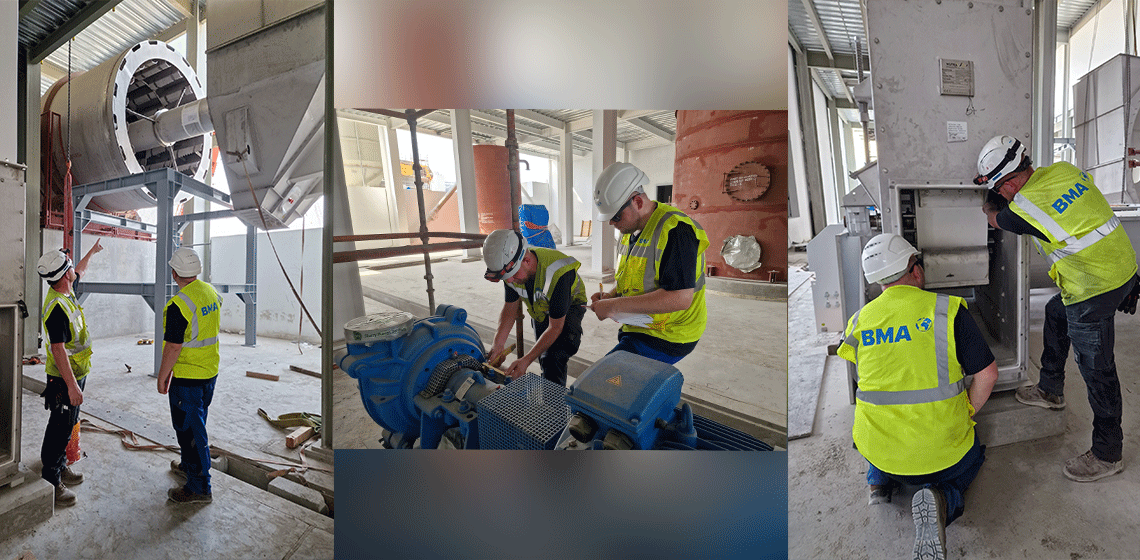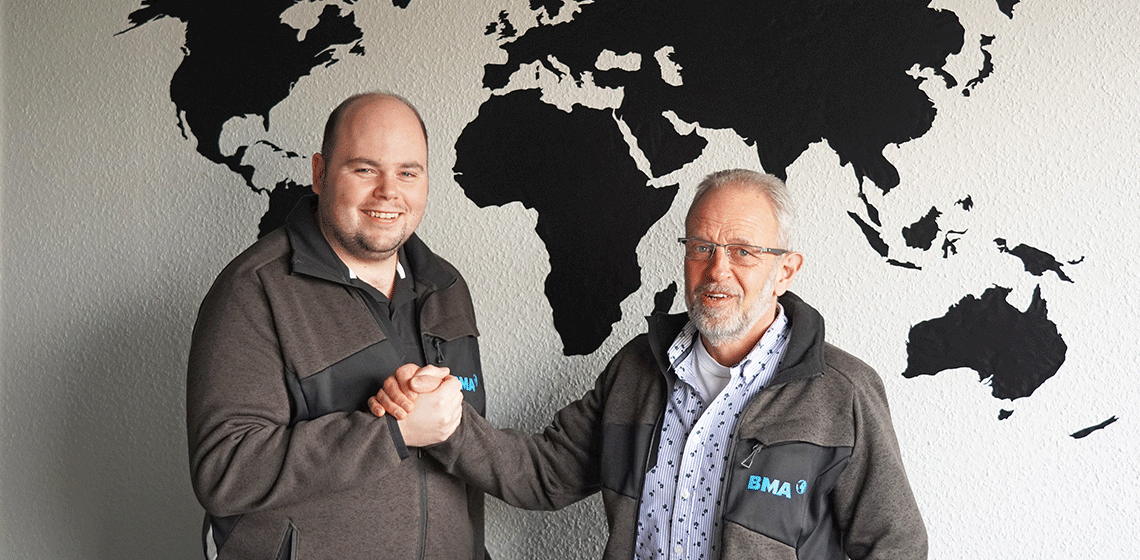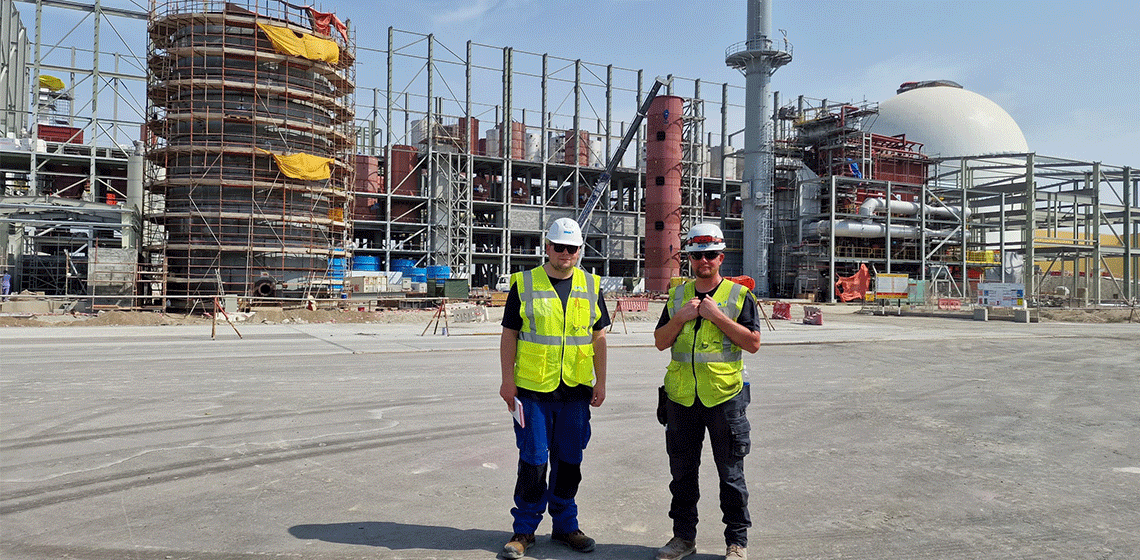They represent two generations of site supervisors at BMA: Rainer Tesch can look back on a career in this field spanning four decades, while Daniel Dohnalek has only been working on our construction sites for a few months. In this interview, they talk about the fascination of working internationally, the complexity of their tasks, and the special moments in their everyday work.
Site supervisor at BMA: setting the pace at the construction site
Rainer Tesch and Daniel Dohnalek let us catch a glimpse of their unusual field of work
Mr Tesch, could you tell us more about your job as a site supervisor at BMA? What would be typical tasks for you on a construction site?
Rainer Tesch: As a site supervisor at BMA, my main responsibility is to ensure that all components are professionally assembled, for the plant to function smoothly. That’s a complex job, particularly in a large-scale project such as an extraction tower from BMA: it’s 30 to 40 m high, weighs 800 t and consists of a large number of individual components.
What does your work involve in detail?
Rainer Tesch: I start my work in Braunschweig, where I look at the design drawings to plan the logistics for shipment of the components. At the construction site, I make sure that the right number of components and the right sizes have been delivered. I prepare an assembly schedule and coordinate the work processes of the individual teams, including the scaffolders, crane companies and pipe layers. My job is finished when the plant has successfully completed its test run. I sometimes work up to half a year on projects such as an extraction tower from BMA – with breaks, of course, so I can spend some time at home.
Mr Dohnalek, what made you decide to become a site supervisor?
Daniel Dohnalek: I started out at BMA training as an industrial machinery mechanic and then spent several years in apparatus construction as a skilled worker. When the opportunity arose to do something completely different, I definitely wanted to take it. Of course I discussed the decision in detail first with my family and my girlfriend. She encouraged me, saying “You’re still young – if you don’t do it now, when will you?”
What was the next step?
Daniel Dohnalek: When you start as a site supervisor at BMA, the first step is thorough training. I learned a lot, especially from experienced colleagues like Rainer. Gradually I started to take on my own tasks, to become more independent.

Rainer Tesch: Daniel has mastered the theory. Now it’s time for him to gain hands-on experience on a construction site and apply what he has learnt.
Have you already worked on a construction site?
Daniel Dohnalek: Yes, I had the opportunity to work in an assisting role on a construction site in Oman for three weeks. That was followed by another three-week posting to El Salvador. Although assembly of the plants is always more or less the same, there were huge differences in the processes between the construction sites in Asia and Central America. It is often said that work on a construction site is varied – and I really found that to be true.
Rainer Tesch: BMA is an international company and does business across the globe. Every construction site is different, and it’s important to quickly adjust to the local situation and the different cultures. There are new challenges every day, and as the first point of contact at BMA, you have to be able to propose a solution in each case. I sometimes think I’ve seen it all – and then something happens that’s completely new to me. In order to deal with that, you need to have both feet firmly on the ground and plenty of self-confidence.
What other skills and attributes should a good site supervisor have?
Rainer Tesch: As a site supervisor, you should be familiar with different areas such as steel construction, boilermaking and mechanical engineering, so you can supervise and coordinate the entire plant assembly. It’s also important to be open-minded, because you’re a guest in another country. Flexibility is another crucial attribute, because travelling and long absences from home are normal in our work. We’re generally away for ten months of the year.
How has the job of a site supervisor changed over time?
Rainer Tesch: Although the actual tasks of a site supervisor haven’t changed much over time, many things are different today. My first posting was to a construction site in Egypt, where BMA was building a whole sugar factory. I worked there for almost half a year, without a break. At the time, there was virtually no way of keeping in touch with people back home. There were no mobile phones, only letters. Every four weeks, I’d get a parcel with a stack of newspapers, to keep me up to date on what was happening in Braunschweig. Things are a lot easier for Daniel today.
Daniel Dohnalek: The working times these days are no longer the same. During a posting, I can take the odd week off and go home. I can have video chats on WhatsApp with my girlfriend. And after work I can switch on my laptop to watch a film or read the latest news.
Would you say that your job is varied, but so are the experiences outside of work?
Daniel Dohnalek: Definitely. One Sunday, our customer in El Salvador took us out on a hike to a volcano. That was incredibly impressive. I saw landscapes that I have trouble finding the words to describe.
What are your hopes for the future?
Daniel Dohnalek: I look forward to my new responsibilities. An experienced site supervisor once said to me: “I don’t work for the money, but because every trip is an adventure.”
Rainer Tesch: (laughs) Oh, I wonder who that could’ve been... But seriously, even though the work on a construction site can often be stressful, there are so many positive moments that stay with you. And when I stand in front of a completed extraction tower and realise that I played a major part in building it – now, that’s a fantastic feeling.


